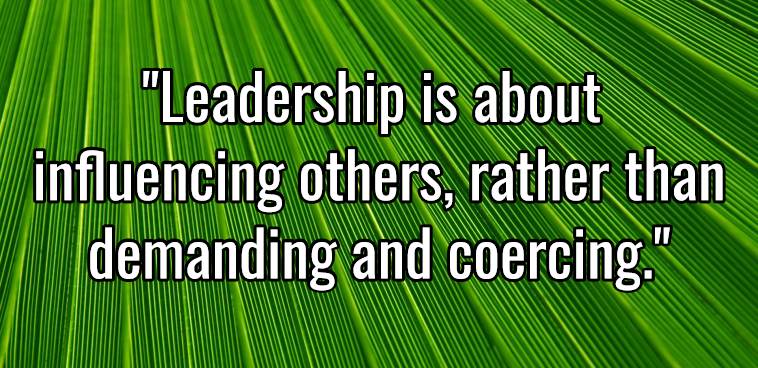In my last post, I introduced the 3 Is of leadership: integrity, influence and impact, and discussed how leaders can live and lead with increased integrity. In this post, we will focus on influence, and how a leader’s integrity directly allows them to influence.
At the heart of great leadership is influence, as in the ability to influence others to do what needs to get done.
In a piece written for Forbes, Kevin Kruse defines leadership as “a process of social influence, which maximizes the efforts of others, towards the achievement of a goal.” I like his approach because it factors in some important primary leadership elements: (social) influence, optimization of others’ efforts, and goals.
Leadership is about influencing others, rather than demanding and coercing. It speaks to the ability to win people over to a new way of thinking and practice, through idea sharing, collaboration and role modeling. It emphasizes persuasion and motivation over coercion.
Influence occurs primarily through emotional connections, such as when we share triumphant or challenging times together. It also develops when leaders routinely demonstrate feelings of appreciation, care, concern and empathy.
In a speech to graduating cadets at the Royal British Military Academy in 1944, Dwight D. Eisenhower said:
“You must know every single one of your men. It is not enough that you are the best soldier in that unit, that you are the strongest, the toughest, the most durable, the best equipped, technically. You must be their leader, their father, their mentor, even if you’re half their age. You must understand their problems. You must keep them out of trouble; if they get in trouble, you must be the one who goes to their rescue. That cultivation of human understanding between you and your men is the one part that you must yet master, and you must master it quickly.”
Clearly, this message has been embraced by the US military as well. Simon Sinek is a best-selling author on team-building. He learned some of his core leadership beliefs from retired Marines Lt. Gen. George Flynn. Flynn was explaining what makes the Corps so extraordinarily tight-knit, to the point that they willingly entrust their lives to one another. He told Sinek that when Marines line up for their food each day, the most junior officers go first, following in rank order. Their leaders eat last. Such procedures are not recorded in the Marine Corps handbook or procedural code. Nor are they expressed at roll call. It’s just the way that Marine leadership views its responsibility.
Many people think leadership is about rank, power and privilege. Marines, however, maintain that true leadership is the willingness to place others’ needs above your own. That’s why Sinek titled his book “Leaders Eat Last: Why Some Teams Pull Together and Others Don’t.” True leadership, he writes, is about empowering others to achieve things they didn’t believe possible.
By prioritizing the well-being of their people, exceptional organizations motivate their workers to give everything they’ve got to advance the organization. Peter Drucker once described it as “lifting a person’s vision to higher sights, the raising of a person’s performance to a higher standard, the building of a personality beyond its normal limitations.”
Another way to become more influential is to build strong relationships with your people based on communication and empathy. As the saying goes, “I don’t care how much you know until I know how much you care.”
The process of connecting with your professional team begins with becoming acquainted with them as individuals.
Try to learn and understand their strengths and their goals, professional as well as personal. What are they passionate about? What are their concerns?
People appreciate when you take an honest interest in then and demonstrate care. They also love it when you can identify specific qualities and behaviors that make them special.
Once you have succeeded in developing positive professional relationships, it is more likely that people within the organization will candidly update you on internal developments, warn you about potential challenges or landmines and even tolerate your mistakes more willingly. This can be valuable, particularly at the beginning of your tenure.
By prioritizing the well-being of their people, exceptional leaders motivate their employees to give everything they’ve got to advance the organization.
Naphtali Hoff, PsyD, (@impactfulcoach) is president of Impactful Coaching & Consulting. Check out his leadership book, “Becoming the New Boss.” Read his blog, and listen to his leadership podcast. Download his free new e-book, “An E.P.I.C. Solution to Understaffing.”
If you enjoyed this article, sign up for SmartBrief’s free e-mail on leadership and career development, among SmartBrief’s more than 200 industry-focused newsletters.
